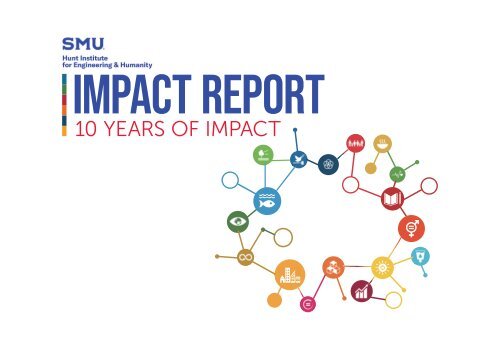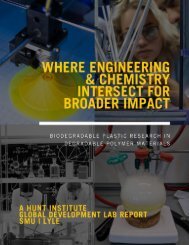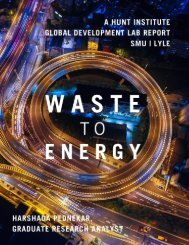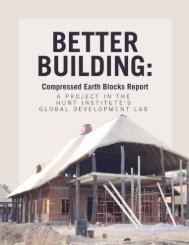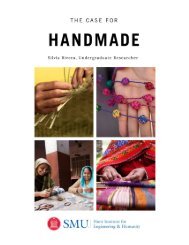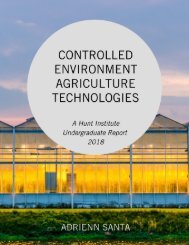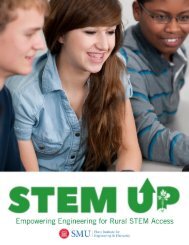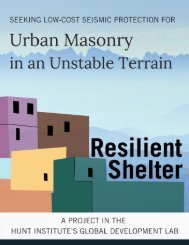Hunt Institute for Engineering & Humanity: 10 YEARS OF IMPACT
Much of our current economy, institutions and approaches to addressing societal problems predates what Stephen Hawking termed the “century of complexity.” A hallmark of this era of complexity is interconnectivity, rendering the dichotomies of developed vs. underdeveloped countries increasingly meaningless. Complex societal challenges such as poverty, inequality, food insecurity, climate change, deteriorating health, gender disparity, educational divide and environmental degradation, just to name a few, are deeply interconnected and shared across rich and poor countries alike. Over the past decade we tested, piloted, and implemented novel approaches to holistically tackle these interconnected problems to foster climate-smart inclusive economic development. Our ultimate goal is to ensure that access to opportunities and economic prosperity is shared and we leave a healthy planet for future generations. Our approach has been operational for only a few years but its impact has already been noteworthy and we are proud to share some of the highlights in this report.
Much of our current economy, institutions and approaches to addressing societal problems predates what Stephen Hawking termed the “century of complexity.” A hallmark of this era of complexity is interconnectivity, rendering the dichotomies of developed vs. underdeveloped countries increasingly meaningless. Complex societal challenges such as poverty, inequality, food insecurity, climate change, deteriorating health, gender disparity, educational divide and environmental degradation, just to name a few, are deeply interconnected and shared across rich and poor countries alike. Over the past decade we tested, piloted, and implemented novel approaches to holistically tackle these interconnected problems to foster climate-smart inclusive economic development. Our ultimate goal is to ensure that access to opportunities and economic prosperity is shared and we leave a healthy planet for future generations. Our approach has been operational for only a few years but its impact has already been noteworthy and we are proud to share some of the highlights in this report.
You also want an ePaper? Increase the reach of your titles
YUMPU automatically turns print PDFs into web optimized ePapers that Google loves.
<strong>IMPACT</strong> REPORT<br />
<strong>10</strong> <strong>YEARS</strong> <strong>OF</strong> <strong>IMPACT</strong>
Communities around the world are experiencing increasing<br />
uncertainties with respect to livelihoods, inequality and<br />
environmental degradation. Dallas exhibits the paradox of<br />
being home to Fortune 500 corporations along with vast food<br />
deserts, a digital divide, severe neighborhood inequality and<br />
urban heat islands.<br />
Photo: Melody Hamilton<br />
2
<strong>Hunt</strong> <strong>Institute</strong> Impact Report<br />
TABLE <strong>OF</strong><br />
CONTENTS<br />
1<br />
2<br />
TEN <strong>YEARS</strong> <strong>OF</strong> <strong>IMPACT</strong><br />
• Our Mission<br />
• Translating Global Goals into Local Action<br />
• Letter from the Executive Director<br />
• Our Milestones<br />
AGGREGATING FOR <strong>IMPACT</strong><br />
• Igniting Collective Action<br />
• Leveraging Market Forces<br />
• Our Focus<br />
• Our Approach<br />
3<br />
OUR PROGRAMS<br />
• Building the Ecosystem<br />
• Engaging the Community<br />
• Incubating Solutions<br />
4<br />
EMPOWERING THE NEXT<br />
GENERATION <strong>OF</strong> CHANGEMAKERS<br />
5<br />
PIONEERING CLIMATE-SMART INCLUSIVE<br />
ECONOMIC DEVELOPMENT EDUCATION<br />
6<br />
OUR PEOPLE<br />
3
01<br />
<strong>Hunt</strong><br />
<strong>Institute</strong> Impact Report<br />
TEN <strong>YEARS</strong> <strong>OF</strong> <strong>IMPACT</strong>
OUR MISSION<br />
• Develop and scale sustainable and af<strong>for</strong>dable technologies and solutions<br />
addressing the challenges facing under-resourced communities<br />
• Foster market-based mechanisms that create sustainable livelihood<br />
opportunities that respect the dignity of individuals and communities<br />
• Serve as a national and international hub and convening plat<strong>for</strong>m <strong>for</strong><br />
business, academia, NGOs and governmental organizations<br />
• Leverage talent from various disciplines and focus on the education of<br />
engineering and non-engineering students alike
<strong>Hunt</strong> <strong>Institute</strong> Impact Report<br />
<strong>10</strong> <strong>YEARS</strong> <strong>OF</strong> <strong>IMPACT</strong><br />
TRANSLATING GLOBAL GOALS INTO LOCAL ACTION<br />
Scaling social impact with climate-smart inclusive economic development<br />
During its first decade of operation, the <strong>Hunt</strong> <strong>Institute</strong>’s<br />
work has impacted all 17 Sustainable Development Goals<br />
(SDGs) set <strong>for</strong>th in 2015 by the United Nations and<br />
subsequently adopted by 193 countries. The SDGs call<br />
<strong>for</strong> action by all countries to promote prosperity while<br />
protecting the planet. These goals reflect the important<br />
recognition that ending poverty must go hand-in-hand<br />
with strategies that build economic prosperity and address<br />
a range of social needs including education, health, social<br />
protection, and job opportunities, while tackling climate<br />
change and protecting the natural environment.<br />
The <strong>Hunt</strong> <strong>Institute</strong>’s work touches each of the 17 SDGs<br />
through its holistic approach to fostering climate-smart<br />
inclusive economic development. We thank all of our<br />
partners and supporters who have empowered our work<br />
over the past ten years.<br />
The United Nations’ Sustainable Development<br />
Goals (SDGs) are a call <strong>for</strong> action by all countries<br />
to promote prosperity while protecting the planet.<br />
6
<strong>Hunt</strong> <strong>Institute</strong> Impact Report<br />
<strong>10</strong> <strong>YEARS</strong> <strong>OF</strong> <strong>IMPACT</strong><br />
LETTER FROM<br />
EXECUTIVE DIRECTOR EVA CSAKY<br />
Much of our current economy, institutions and approaches to addressing societal problems predates what Stephen Hawking termed the<br />
“century of complexity.” A hallmark of this era of complexity is interconnectivity, rendering the dichotomies of developed vs. underdeveloped<br />
countries increasingly meaningless. Complex societal challenges such as poverty, inequality, food insecurity, climate change, deteriorating<br />
health, gender disparity, educational divide and environmental degradation, just to name a few, are deeply interconnected and shared across<br />
rich and poor countries alike.<br />
Over the past decade we tested, piloted, and implemented novel approaches to holistically tackle these interconnected problems to foster<br />
climate-smart inclusive economic development. Our ultimate goal is to ensure that access to opportunities and economic prosperity is shared<br />
and we leave a healthy planet <strong>for</strong> future generations. While that might sound like a Utopian aspiration and a theoretical exercise, it is not.<br />
The hundreds of scaled best practices from around the world that we have collected and analyzed clearly indicate that there are possible<br />
solutions, driving our persistence to find the most effective and efficient approach <strong>for</strong> fostering such solutions in our era. The novel approach<br />
we utilize simultaneously leverages international best practices, the ingenuity of our close to one hundred expert affiliates, the passion and<br />
talent of students from across disciplines, and the insights and wisdom of communities.<br />
Our approach has been operational <strong>for</strong> only a few years but its impact has already been noteworthy and we are proud to share some of the<br />
highlights in this report. Perhaps even more importantly, as we focus our attention on building back better from the pandemic, we hope that these<br />
experiences offer an actionable roadmap <strong>for</strong> scaling impact and deliberately transitioning towards a climate-smart and inclusive economy.<br />
Thank you <strong>for</strong> your partnership.<br />
Eva Szalkai Csaky, PhD MSF<br />
Executive Director<br />
7
<strong>Hunt</strong> <strong>Institute</strong> Impact Report<br />
<strong>10</strong> <strong>YEARS</strong> <strong>OF</strong> <strong>IMPACT</strong><br />
OUR MILESTONES<br />
E&H Week:’From<br />
Innovation to Impact‘<br />
Opening of<br />
James Pratt Library<br />
Design of new<br />
operational and<br />
programmatic structure<br />
to support scaling the<br />
<strong>Institute</strong>’s impact<br />
Launch of Blockchain<br />
and Trans<strong>for</strong>mational<br />
Technology Hub<br />
Launch of MASD CIED<br />
course & concentration<br />
Launch of Social<br />
Enterprise Program<br />
‘Intrapreneurs’ cohort<br />
2011 2013 2015 2017 2019<br />
2012 2014 2018 2020<br />
<strong>Hunt</strong> <strong>Institute</strong> becomes<br />
operational with launch<br />
of <strong>Engineering</strong> &<br />
<strong>Humanity</strong> (E&H) Week<br />
called ‘ReFrame’ to<br />
highlight af<strong>for</strong>dable and<br />
sustainable housing<br />
E&H Week: ‘Water:<br />
Ripple Effects’<br />
Climate Extremes<br />
conference leading<br />
up to COP21 Launch<br />
of Inclusive Economy<br />
Consortium Testing of<br />
innovation incubation<br />
approaches<br />
Launch of Global<br />
Development Lab<br />
and Social Enterprise<br />
Program Pilots<br />
Launch of<br />
ImpactNights TM<br />
& Satellites<br />
AWARENESS RAISING PHASE<br />
CLIMATE—SMART INCLUSIVE ECONOMIC DEVELOPMENT<br />
(CIED) TEST & PILOT PHASE<br />
CIED SCALING PHASE<br />
8
Photo: The 2014 ribbon-cutting ceremony <strong>for</strong> the James Pratt library, donated to and housed in the <strong>Hunt</strong> <strong>Institute</strong>, included James and Joan Pratt, Alexandra, Ilya and Sabrina Pratt, Dr.<br />
Bobby Lyle, Stephanie and <strong>Hunt</strong>er <strong>Hunt</strong>, Dr. Eva Csaky, Peter Brown and others.<br />
“James Pratt was a celebrated mid-century Texas architect with many significant buildings to his name. His even greater legacy is as an early, thoughtful and provocative<br />
thinker about the urbanism of the city of Dallas. His book, ‘Dallas Visions’, beautifully illustrated with his drawings and plans, laid out a conceptual structure not only <strong>for</strong><br />
Dallas city planning, but also <strong>for</strong> the ambitious quality of urban life that Pratt imagined <strong>for</strong> the whole city.”<br />
—Dr. Jessie Marshall Zarazaga, PhD, RIBA leed AP, Curator of the Pratt Collection<br />
9
02<br />
<strong>Hunt</strong> <strong>Institute</strong> Impact Report<br />
AGGREGATING FOR <strong>IMPACT</strong>
<strong>Hunt</strong> <strong>Institute</strong> Impact Report<br />
AGGREGATING FOR <strong>IMPACT</strong><br />
IGNITING COLLECTIVE ACTION<br />
The <strong>Hunt</strong> <strong>Institute</strong>'s novel multiplier approach <strong>for</strong>ges connections across geographies, stakeholders, sectors, disciplines and even generations to ignite collective<br />
action. These include a core leadership team, an international multidisciplinary group of experts who serve the <strong>Institute</strong> as fellows and affiliates, students from<br />
across disciplines, partners from every community where we work, both locally and internationally, and a professional network of interested parties.<br />
Networked Impact+<br />
Partners<br />
Our Network<br />
Collective<br />
Action<br />
Core Team<br />
Fellows &<br />
Affiliates<br />
Student Team<br />
NETWORKED <strong>IMPACT</strong> + is accomplished through<br />
the <strong>Hunt</strong> <strong>Institute</strong>’s novel multiplier approach<br />
Photo: The <strong>Hunt</strong> <strong>Institute</strong> hosts regular convenings to foster connections,<br />
knowledge sharing and collaborations.<br />
11
<strong>Hunt</strong> <strong>Institute</strong> Impact Report<br />
AGGREGATING FOR <strong>IMPACT</strong><br />
LEVERAGING MARKET FORCES<br />
Solving social and environmental problems while creating<br />
economic opportunities<br />
Five billion people who earn less than $8 a day around the world spend $5 trillion a year on food, housing, energy, water, in<strong>for</strong>mation and communication technology (ICT),<br />
transportation, and health. Businesses that address those needs with quality products and services have an opportunity to profit while positively impacting low-income<br />
communities. This is the essence of “base-of-the-pyramid” (BOP) strategies.<br />
Despite the influence of BOP strategies over the<br />
past 15 years, they have gained little ground in<br />
industrialized economies. The <strong>Hunt</strong> <strong>Institute</strong> estimates<br />
the size of the BOP market in the United States at<br />
$1 trillion, representing 25% of U.S. households<br />
and 13% of all U.S. consumer expenditures. These<br />
households are more likely to be headed by a woman<br />
and to have a dependent (child or elderly), more<br />
likely to be African American, and less likely to own<br />
a home or hold a college education. Not surprisingly,<br />
the demand is concentrated in the same areas<br />
as internationally: housing, food, transportation,<br />
healthcare and energy. The <strong>Hunt</strong> <strong>Institute</strong>’s work<br />
focuses on these sectors to generate economic<br />
opportunities and jobs while meeting people’s<br />
most important needs in a sustainable and<br />
climate-smart fashion.<br />
$5 TRILLION GLOBAL BOP MARKET<br />
HEALTH<br />
WATER<br />
ENERGY<br />
HOUSING<br />
ICT<br />
TRANSPORTATION<br />
OTHER<br />
Source: World Resources <strong>Institute</strong><br />
FOOD<br />
WATER<br />
$1 TRILLION US BOP MARKET<br />
HOUSING<br />
FOOD<br />
HEALTHCARE<br />
OTHER<br />
Source: <strong>Hunt</strong> <strong>Institute</strong> <strong>for</strong> <strong>Engineering</strong> & <strong>Humanity</strong><br />
TRANSPORTATION<br />
ENERGY<br />
APPAREL &<br />
PERSONAL<br />
CARE<br />
INSURANCE &<br />
PENSIONS<br />
ICT<br />
EDUCATION<br />
WATER &<br />
PUBLIC SERVICES<br />
Low-income and under-resourced communities collectively represent an significant and often untapped market at the “base-ofthe-pyramid”<br />
(BOP). Most of this purchasing power represents demand <strong>for</strong> food, housing, transportation, energy and healthcare.<br />
2%<br />
12
R FOCUS<br />
<strong>Hunt</strong> <strong>Institute</strong> Impact Report<br />
AGGREGATING FOR <strong>IMPACT</strong><br />
RK FOCUSES<br />
OUR<br />
ON LEVERAGING<br />
FOCUS<br />
TECHNOLOGY TO IMPROVE<br />
IC OPPORTUNITIES AND ACCESS. WE DO SO WITH AN<br />
IS ON TWO SECTORS IN PARTICULAR: SUSTAINABLE FOOD<br />
AND RESILIENT INFRASTRUCTURE, SUCH AS HOUSING,<br />
AND ICT. THESE ARE TWO AREAS FACING SOME <strong>OF</strong> THE<br />
ESSING CHALLENGES AS WELL AS OPPORTUNITIES TO<br />
E HUMAN The WELL <strong>Hunt</strong> <strong>Institute</strong>’s BEING, work CREATING focuses on two critical ENTREPRENEURIAL<br />
areas; sustainable food systems and<br />
UNITIES AND resilient DECENT infrastructure (housing, JOB IN energy THE and ICT). PROCESS. We develop technologies IN ORDER and solutions TO<br />
THAT THESE OPPORTUNITIES ARE INCLUSIVE AND<br />
LE, HOWEVER, in these areas WE that ALSO not only mitigate NEED the TO risks of PRIORITIZE climate change, but HUMAN simultaneously meet<br />
IN EVERY basic ASPECT needs and create <strong>OF</strong> decent OUR jobs WORK and entrepreneurial AND FOSTER opportunities. THE To ensure that these<br />
RY FINANCIAL INNOVATIONS TO ENABLE <strong>IMPACT</strong> AT SCALE.<br />
opportunities are inclusive and equitable, we develop human capital through education<br />
and training. To guarantee the scalability of these solutions, we foster innovative impact<br />
finance approaches.<br />
HUMAN<br />
CAPITAL<br />
sustainable<br />
food<br />
system<br />
SUSTAINABLE<br />
RESILIENT<br />
FOOD<br />
FINANCE TECHNOLOGY TECHNOLOGY INFRA-<br />
SYSTEM<br />
STRUCTURE<br />
HUMAN<br />
CAPITAL<br />
FINANCE<br />
RESILIENT<br />
INFRASTRUCTURE<br />
Photo: Melody Hamilton<br />
13
<strong>Hunt</strong> <strong>Institute</strong> Impact Report<br />
AGGREGATING FOR <strong>IMPACT</strong><br />
OUR APPROACH<br />
A holistic model <strong>for</strong> tackling<br />
complex problems<br />
Making sense of the complexity that influences the work of social<br />
entrepreneurs & climate-smart inclusive economic development<br />
BUILD<br />
ECOSYSTEM<br />
Best Practice & Ecosystem Analysis<br />
Blockchain & Trans<strong>for</strong>mational Technology Hub<br />
Financial Innovation & Inclusion<br />
Convening stakeholders<br />
across sectors and disciplines<br />
to connect, share and act<br />
Inclusive Economy Consortium<br />
ImpactNights <br />
Outreach<br />
ENGAGE<br />
COMMUNITY<br />
INCUBATE<br />
SOLUTIONS<br />
Trans<strong>for</strong>ming the best<br />
ideas into actionable<br />
projects and solutions<br />
Social Enterprise Program<br />
Global Development Lab<br />
Special Initiatives<br />
14
03<br />
<strong>Hunt</strong><br />
<strong>Institute</strong> Impact Report<br />
OUR PROGRAMS<br />
Photo: In front of the Meadows Museum on SMU’s Dallas campus is Santiago Calatrava’s dynamic sculpture,“The Wave,” the artist’s first large-scale sculpture to be permanently installed<br />
in the United States.
BUILDING THE<br />
ECOSYSTEM<br />
Photo: Launch of the Blockchain & Trans<strong>for</strong>mational Technology Hub in 2018
<strong>Hunt</strong> <strong>Institute</strong> Impact Report<br />
OUR PROGRAMS<br />
BEST PRACTI CE & ECOSYSTEM ANALYSIS<br />
For climate-smart inclusive economic development<br />
The <strong>for</strong>ces of globalization, technological advancement, and climate<br />
change have created new and often complex challenges when it comes<br />
to economic inclusion and livelihoods. To address these issues, the <strong>Hunt</strong><br />
<strong>Institute</strong> team and fellows have been studying innovative solutions and<br />
best practices in climate-smart inclusive economic development from<br />
around the world.<br />
While solutions often cannot and should not simply be replicated<br />
across different geographies, there is much to learn from studying the<br />
experiences of others. We document and analyze best practices and<br />
the ecosystems they have succeeded in to identify key patterns to help<br />
empower all relevant stakeholders.<br />
PHASE 1<br />
<strong>10</strong>5<br />
INTERNATIONAL<br />
BEST PRACTICES<br />
PHASE 2<br />
418<br />
INTERNATIONAL<br />
BEST PRACTICES<br />
Photo: Executive Director Dr. Eva Csaky and <strong>Hunt</strong> <strong>Institute</strong> Fellow Anna Clark were<br />
invited to present "Pathways to Scaling Social and Environmental Impact towards<br />
Inclusive and Sustainable Economic Development” at the Disruptive Innovation,<br />
Value Chains and Rural Development Conference hosted by the World Bank. The<br />
key findings of this work arecaptured in the CAISE model and the subject of an<br />
upcoming book (see page 18).<br />
17
COLLECTIVE ACTION FOR AN<br />
INCLUSIVE SUSTAINABLE<br />
ECONOMY (CAISE) MODEL<br />
The aim of this work is to demystify the paradigm of climate-smart<br />
inclusive economic development <strong>for</strong> all stakeholders. Our analysis of<br />
best practices from around the world reveals key features that successful<br />
climate-smart inclusive economy ef<strong>for</strong>ts share, including:<br />
• Systems approach to<br />
complex problems<br />
• Multi-sector and multistakeholder<br />
partnerships<br />
• Leveraging of private sector<br />
value chains<br />
• Aggregation of small<br />
economic actors<br />
• Ongoing knowledge and<br />
skill development<br />
• Communities empowered<br />
to lead<br />
• Policies with ongoing data<br />
collection and feedback loops<br />
Source: “Scaling Social and Environmental Impact Through Inclusive Value Chains and Disruptive Collaboration” (Csaky, E.;<br />
Clark, A.; Rivera, S., 2018)<br />
• Innovative risk assessment<br />
and financing approaches<br />
18
<strong>Hunt</strong> <strong>Institute</strong> Impact Report<br />
OUR PROGRAMS<br />
BLOCKCHAIN HUB<br />
In partnership with:<br />
The Blockchain Hub was created in 2018 in partnership with FinTech4Good and the Blockchain Frontier Group to promote the understanding of the potential<br />
applications of blockchain and adjacent technologies <strong>for</strong> social and environmental impact and to serve as a multi-disciplinary and multi-stakeholder hub <strong>for</strong> those solutions.<br />
Data aggregation<br />
& mapping<br />
The <strong>Hunt</strong> <strong>Institute</strong> and its partner<br />
organizations are working to<br />
improve access to in<strong>for</strong>mation and<br />
resources through the ecosystem<br />
mapping of the climate-smart<br />
inclusive economy and the innovative use<br />
of technology. The Hub aggregates data through multiple<br />
mechanisms and disseminates relevant in<strong>for</strong>mation as well<br />
as analytics to different audiences. This approach helps<br />
empower individuals, businesses and service providers alike<br />
while generating policy-relevant analytics.<br />
<strong>10</strong><br />
USE<br />
CASES<br />
FROM<br />
SOCIAL & ENVIRONMENTAL<br />
<strong>IMPACT</strong> AREAS<br />
CATALOGUED<br />
Graphic: Blockchain Hub and adjacent technologies have proven to have high potential <strong>for</strong> trans<strong>for</strong>mational impact.<br />
19
In 2020, during the pandemic, the Veteran Women<br />
Enterprise Center (“VWEC”), led by <strong>Hunt</strong> <strong>Institute</strong><br />
Fellow and Navy veteran VR Small, successfully<br />
piloted the Financial First Bootcamp, an innovative<br />
and comprehensive capacity-building program<br />
aimed at financial empowerment, developed by<br />
the <strong>Hunt</strong> <strong>Institute</strong> and FinTech4Good. Beyond<br />
financial management, the program includes<br />
training on access to finance, climate-smart<br />
strategies and their financial benefits, as well as the<br />
latest insights about innovative financing options<br />
such as crowdfunding and fintech. Based on the<br />
success of the pilot, the partners are in the process<br />
of expanding the program, which will be offered by<br />
VWEC across the United States in 2022.<br />
“The 4th industrial revolution can both empower<br />
and leave behind small businesses. This is especially<br />
the case <strong>for</strong> under-resourced entrepreneurs. Training<br />
curriculums become outdated quickly and small<br />
businesses often do not have access to the latest<br />
knowledge that can help them succeed. This novel<br />
dynamic program that is designed to connect to cuttingedge<br />
knowledge resources in our fast changing world<br />
greatly benefi ts our entrepreneurs.”<br />
VR Small,<br />
CEO of the Veteran Women<br />
Enterprise Center<br />
20
<strong>Hunt</strong> <strong>Institute</strong> Impact Report<br />
OUR PROGRAMS<br />
<strong>IMPACT</strong> FINANCE &<br />
FINANCIAL INCLUSION<br />
The <strong>Hunt</strong> <strong>Institute</strong>’s team and fellows have been pioneers in the impact<br />
finance field and are focused on developing innovative solutions to solve<br />
the significant funding gap <strong>for</strong> climate change, especially as it relates to<br />
underserved groups such as farmers, small businesses, low-income families<br />
and female-owned businesses. Despite its growing importance, impact<br />
finance only meets a small fraction of this need and has relied heavily on<br />
public funding sources. The <strong>Institute</strong> is addressing this challenge through<br />
multiple fronts. We developed programs to address critical demand-side<br />
barriers to financial inclusion such as financial literacy. Additionally, we have<br />
created innovative tools to assist social entrepreneurs in accessing financing<br />
and implemented capacity building regarding crowdfunding and fintech.<br />
Critically, our team has developed unique expertise in designing<br />
and implementing novel financial structures and approaches that<br />
reduce the barriers and has shown to significantly increase the<br />
engagement of private capital in impact financing.<br />
Partner:<br />
Chart: The World Bank estimates that $90 trillion is necessary in the<br />
next <strong>10</strong> years just to mitigate the risks of climate change. Annual impact<br />
finance flows are not on track to meet this need. Innovative financial<br />
mechanisms have proven to be able to mobilize private capital with a<br />
strong multiplier effect.<br />
21
As part of a collaboration with the George W. Bush Presidential<br />
Center’s WE Lead Scholars program, an initiative <strong>for</strong> women<br />
leaders from the Middle East, North Africa, and Afghanistan<br />
(”MENA”), the <strong>Hunt</strong> <strong>Institute</strong> convened an Impact Finance<br />
workshop in Washington, DC with international experts in<br />
sustainable finance and impact investing.<br />
<strong>Hunt</strong> <strong>Institute</strong> Executive Director Dr. Eva Csaky and <strong>Hunt</strong><br />
<strong>Institute</strong> Fellows Dr. Yasmin Saadat, Dr. Debra Perry, Xiaochen<br />
Zhang, Alison Harwood designed a workshop to share the latest<br />
knowledge about the global impact finance ecosystem and<br />
opportunities and challenges <strong>for</strong> social entrepreneurs seeking<br />
alternative sources of financing.<br />
As Dr. Nadia Zrelli Ben Hamida, a Tunisian economist and<br />
WE Lead Scholar, remarked, “the workshop was very beneficial<br />
and unique in its dichotomy of offering both practical insights<br />
to social entrepreneurs in MENA as well as a comprehensive<br />
overview of the global impact finance ecosystem, including<br />
discussions about different types of funders, financial<br />
instruments, innovative financing mechanisms and the fastevolving<br />
crowdfunding and fintech impact finance landscape.”<br />
Photo: <strong>Hunt</strong> <strong>Institute</strong> Impact Finance workshop <strong>for</strong> the<br />
George W. Bush Presidential Center’s WE Scholars at the<br />
White House Historical Association in Washington DC<br />
22
ENGAGING THE<br />
COMMUNITY<br />
Photo: Community Innovation Lab 2017. The <strong>Hunt</strong> <strong>Institute</strong> and its partners convened more than 30 organizations to co-create solutions <strong>for</strong> equitable healthy food access.<br />
23
<strong>Hunt</strong> <strong>Institute</strong> Impact Report<br />
OUR PROGRAMS<br />
CLIMATE<br />
EXTREMES<br />
A <strong>for</strong>um on adaptation<br />
and resilience in Texas<br />
In 2015, the <strong>Hunt</strong> <strong>Institute</strong> hosted Climate Extremes, an official conference of<br />
COP21 Paris, the United Nations Conference on Climate Change. The largest<br />
convening <strong>for</strong> climate change ever held in Texas until that time, the Climate<br />
Extremes conference was also part of the French American Climate Talks of the<br />
French Embassy in Washington on the road to COP21. Held in Paris, COP21<br />
was a truly global and local collaboration among countries and cities as well as<br />
the public, private and third sectors..<br />
Above left: Mayor Mike Rawlings. Above right: Conference was sold out with over<br />
300 participants and broadcast live online <strong>for</strong> those unable to attend in person.<br />
The Climate Extremes conference had a unique<br />
focus on the intersection of climate change and<br />
economic inclusion. It offered a unique opportunity<br />
to understand why mitigating climate extremes is<br />
important, and redefined what is possible in using<br />
collaboration and collective action to address climate<br />
change at home and abroad.<br />
Above: Other speakers included Garrett Boone, Container Store Co-Founder<br />
and Chairman Emeritus, Drew Byrd, Schneider Electric executive, Trammell S.<br />
Crow, founder of EarthX, Dr. Eva Csaky, Executive Director of the <strong>Hunt</strong> <strong>Institute</strong>,<br />
Jill Jordan, Dallas’ Assistant City Manager, Russell Laughlin, Hillwood Properties<br />
executive, Dr. Bruce McCarl, Nobel Peace Prize-winning economist, Janette<br />
Monear, President and CEO of the Texas Trees Foundation, with renowned<br />
journalist Lee Cullum moderating the discussion.<br />
24
Photo: The Climate Extremes conference generated connections and conversations across the private, public and nonprofit sectors, leading to requests <strong>for</strong> the creation of an ongoing<br />
<strong>for</strong>um to facilitate the continuation of these conversations, collaboration and collective action. This led to the birth of the Inclusive Economy Consortium and its flagship regular<br />
gatherings, ImpactNights TM . Pictured is Hon. Sujiro Seam, Consul General of France, giving his opening remarks.<br />
25
<strong>Hunt</strong> <strong>Institute</strong> Impact Report<br />
OUR PROGRAMS<br />
INCLUSIVE ECONOMY<br />
CONSORTIUM<br />
By popular demand, the Inclusive Economy Consortium was created as<br />
an outcome of the Climate Extremes conference to support the ongoing<br />
collaboration of all stakeholders towards climate-smart inclusive<br />
economic development.<br />
The Inclusive Economy Consortium (IEC) is an interdisciplinary<br />
community of diverse stakeholders who are dedicated to creating<br />
an economy that works <strong>for</strong> all. A collaborative plat<strong>for</strong>m <strong>for</strong> social<br />
entrepreneurship, thought leadership, and collective action, our network<br />
empowers change makers from the private, public and nonprofit sectors<br />
to connect, share and act in order to help build the ecosystem <strong>for</strong> a<br />
climate-smart inclusive economy.<br />
20+<br />
COALITION <strong>OF</strong> ITS<br />
KIND IN TEXAS<br />
PARTNERS<br />
1 ST<br />
26
www.insightintodiversity.com<br />
September 202<br />
$3.99<br />
<strong>Hunt</strong> <strong>Institute</strong> Impact Report<br />
OUR PROGRAMS<br />
Impact NightsTM<br />
As a multidisciplinary, peer-based network, the Inclusive Economy<br />
Consortium hosts monthly convenings via ImpactNights in which likeminded<br />
people come together to share experiences and knowledge, and<br />
build relationships and collaborations. Sessions are kept small to promote<br />
conversations and led by topic experts.<br />
Topics covered include:<br />
• Social enterprise vs. social entrepreneurship vs. social innovation<br />
• What is social intrapreneurship and why it is more important than ever<br />
• AI, IOT & blockchain<br />
• Climate change: challenges & opportunities<br />
SEPTEMBER 2021<br />
• Role of corporations in climate-smart inclusive economic development<br />
• Economic lives of refugees<br />
• How can we build back better?<br />
• Sustainable & inclusive finance<br />
• Forgotten fuel: energy efficiency<br />
• Trees: a prescription <strong>for</strong> Dallas<br />
• How civic journalism can restore trust & create a more inclusive economy<br />
with support from<br />
37<br />
EXPERT-LED<br />
SESSIONS<br />
Inspiring Programs in<br />
STEM Award Recipient<br />
INSIGHT Into Diversity recognizes the immense<br />
importance of increasing the number of leaders from<br />
underrepresented groups working in STEM professions<br />
and is proud to announce its 2021 Inspiring Programs<br />
in STEM Award recipients. We recognize colleges,<br />
universities, and organizations <strong>for</strong> programs that are<br />
improving access to STEM fields <strong>for</strong> students from<br />
underrepresented groups.<br />
This award is being presented to institutions whose<br />
programs inspire a new generation of young people<br />
to consider STEM careers as well as support working<br />
professionals in these fields. These remarkable initiatives<br />
are making a significant difference by providing mentoring,<br />
academic and professional support, hands-on activities,<br />
research opportunities, and more. For these ef<strong>for</strong>ts, they<br />
are worthy of national recognition. We congratulate these<br />
institutions on their accomplishments and offer support <strong>for</strong><br />
their future endeavors.<br />
202<br />
INSPIRING PROGRAMS<br />
IN S<br />
AWARD<br />
2021 Inspiring Programs<br />
in STEM Award Recipient<br />
FROM<br />
Your Program Name<br />
27
Photos: ImpactNights TM is a regular gathering of social entrepreneurs from across sectors and disciplines, and the manifestation of the Inclusive Economy Consortium’s mission to<br />
“connect-share-act”. The event connects interested professionals, facilitates the sharing of knowledge and experiences, and fosters collective action towards a more climate-smart,<br />
inclusive and equitable economy. In addition to professional networking, each ImpactNights TM offers interactive knowledge-sharing sessions led by 2-3 experts. Topics are crowdsourced<br />
from the <strong>Hunt</strong> <strong>Institute</strong>’s expert network, and sessions that generate the most interest are followed by collective action sessions designed to implement specific collaborative initiatives.<br />
28
<strong>Hunt</strong> <strong>Institute</strong> Impact Report<br />
OUR PROGRAMS<br />
OUTREACH<br />
In collaboration with community partners, asset-based community<br />
research was completed in 2015-16 to improve our understanding of<br />
challenges and opportunities in Dallas’ under-resourced communities.<br />
The results helped in<strong>for</strong>m our outreach priorities around sustainable<br />
food system, food justice, and community resilience.<br />
We learned early on that the <strong>Institute</strong>’s mobile greenhouse and<br />
science center, “Evie”, fascinated children and youth as much as our<br />
students who helped design and retrofit the old trailer. Evie became a<br />
beloved fixture during the Texas State Fair educating the public about<br />
the sustainability of the food system. Evie’s popularity led to “Eviein-a-Box”,<br />
instructions and related educational content developed<br />
in collaboration with the Caruth <strong>Institute</strong> <strong>for</strong> Education <strong>for</strong> their<br />
renowned summer camps (see next page), which has since been used<br />
as far away as Tunisia.<br />
STEM<br />
EDUCATION FOR GIRLS<br />
FROM TEXAS TO TUNISIA<br />
WITH “EVIE”<br />
15<br />
INTERVIEWS WITH UNSUNG<br />
HEROES DURING<br />
THE PANDEMIC<br />
The Sages & Seekers podcast shares the stories of innovative social<br />
leaders, the resilient communities that have shaped them, and how they<br />
are carrying that legacy <strong>for</strong>ward <strong>for</strong> themselves and others. The series<br />
explores guests' personal experiences with social issues ranging from<br />
inequity in the arts and school segregation to climate change and police<br />
violence. Through conversations with these agents of change, listeners<br />
gain insights into the history of pressing social problems and discover<br />
how we as a global community can work to solve them.<br />
29
Photo: In partnership with the Caruth <strong>Institute</strong> <strong>for</strong> <strong>Engineering</strong> Education, rising 7th and 8th graders visited the <strong>Hunt</strong> <strong>Institute</strong> to learn about sustainable food systems and<br />
build a “mini-Evie” aquaponic system. Pictured are SMU students Wilkie Stevenson (SMU 2020, BS in Mechanical <strong>Engineering</strong>) and Anna Grace Carey (SMU 2019, BA in<br />
Journalism, Political Science and Fashion Media) offering a multidisciplinary perspective on sustainable food systems.<br />
30
INCUBATING<br />
SOLUTIONS<br />
Photo: Earthen construction has been used <strong>for</strong> over 6,000 years. Compressed earth blocks, with the integration of modern technology while still using primarily local<br />
soil, have the potential to be a leading af<strong>for</strong>dable solution <strong>for</strong> sustainable housing construction if some technical and scaling challenges are addressed. Dr. Story and<br />
his research team have successfully tackled some of these challenges in the Global Development Lab and continue to work on others.<br />
31
“The <strong>Hunt</strong> <strong>Institute</strong>’s support has been<br />
critical to Break Bread Break Borders’<br />
success. They were willing to engage with<br />
us at an early stage. Beyond their toolbox,<br />
we benefi ted from the involvement of<br />
many experts, student interns and exposure.<br />
Theirs is not simply a fi nite program<br />
but a permanent hub <strong>for</strong> empowerment<br />
and a community <strong>for</strong> impact. Initially<br />
we were simply focused on learning and<br />
creating a solid business plan. Now we are<br />
sharing our experiences, mentoring others<br />
and <strong>for</strong>ging partnerships, including <strong>for</strong><br />
replicating our model in other parts of the<br />
world. You don’t graduate but evolve in this<br />
approach and in the process our collective<br />
impact is being scaled exponentially.”<br />
Jin-ya Huang,<br />
Founder & CEO<br />
>80,000<br />
LIVES<br />
<strong>IMPACT</strong>ED<br />
32
<strong>Hunt</strong> <strong>Institute</strong> Impact Report<br />
OUR PROGRAMS<br />
SOCIAL ENTERPRISE PROGRAM<br />
Social entrepreneurs take on social and environmental problems<br />
head-on, and they are the link between the <strong>Institute</strong> and under-resourced<br />
communities. Social entrepreneurs build resilience in the communities<br />
they work in by creating economic opportunities <strong>for</strong> under-resourced<br />
communities while tackling societal challenges including access to healthy<br />
food, renewable energy, education and waste reduction.<br />
Social entrepreneurs are catalytic innovators who produce disruptive<br />
innovations, using entrepreneurial and earned income strategies. Social<br />
entrepreneurs often face momentous obstacles, especially in the prescaling<br />
stages of their development. Our program was designed to provide<br />
hands-on and comprehensive support to some of the most innovative<br />
early stage social entrepreneurs and empower them to fulfill their<br />
potential <strong>for</strong> trans<strong>for</strong>mative impact.<br />
Social intrapreneurs represent a key, but often neglected, type of<br />
social entrepreneur. They embody all key traits of social entrepreneurs<br />
but within large organizations, companies or governments. Social<br />
intrapreneurs can bring together the best of both worlds: the innovation<br />
and dynamism of entrepreneurship with the market plat<strong>for</strong>m, reach and<br />
expertise of large companies and organizations.<br />
Left: Tyrone Day of Restorative Farms Top Right: Break Bread Break Borders community<br />
dinner Bottom Right: solar panels installed in the Gambia”<br />
33
Photo: Restorative Farms, a <strong>Hunt</strong> <strong>Institute</strong> Social Enterprise Program alum, is trans<strong>for</strong>ming the Dallas food system. Growing food in the lowest income neighborhoods of Dallas, using<br />
sustainable intensive farming methods while training urban farmers and creating decent jobs. But the vision of Dr. Owen Lynch, Restorative Farms co-founder is much larger. It is creating a<br />
network of small farms and food producers so they can better compete in the complex market dominated by very large players, through improving their access to inputs, in<strong>for</strong>mation and<br />
markets at the most favorable terms possible. Restorative Farms is the result of Dr. Lynch's pioneering research into food deserts over a decade ago and his community research with the<br />
<strong>Hunt</strong> <strong>Institute</strong> to better understand the needs, desires and aspirations of those living in under-resourced communities in Dallas. But, according to Dr. Lynch, “Restorative Farms would not<br />
have become the success it is without the dedicated ef<strong>for</strong>ts of co-founders Brad Boa, Tyrone Day and Dr. Doric Earl along with the multidisciplinary group of experts at the <strong>Hunt</strong> <strong>Institute</strong>.”<br />
Restorative Farms is on track to scale its operations in Dallas and is in discussions about replication in other locations. They are also embarking on incorporating emerging technologies in<br />
their operations as they are scaling production continuing to be at the <strong>for</strong>efront of innovation towards a more climate-smart and inclusive food system.<br />
34
Photograph by Mohammed Njie, SMU/Lyle student, <strong>Hunt</strong> <strong>Institute</strong> Social Entrepreneur, and founder of Janta, a social enterprise with the mission to bring clean energy to the Gambia.<br />
35
<strong>Hunt</strong> <strong>Institute</strong> Impact Report<br />
OUR PROGRAMS<br />
GLOBAL<br />
DEVELOPMENT LAB<br />
The Global Development Lab (GDL) was launched to empower<br />
trans<strong>for</strong>mational ideas in their early stages when many fall through the<br />
cracks. In the GDL theory meets practice with the goal of creating<br />
innovative solutions <strong>for</strong> a resilient humanity addressing the UN’s<br />
sustainable development goals.<br />
Dr. Ali Beskok and Dr. J.C. Chiao, along with their research group, are<br />
developing a novel low-cost, fast and accurate diagnostic device <strong>for</strong> the<br />
detection of malaria, tuberculosis and Covid-19 human antibodies.<br />
A crucial aspect of this approach involves partnerships with local social<br />
entrepreneurs or other entities with systemic community engagement.<br />
The other key pillar of the GDL is the interdisciplinary network of<br />
experts supporting the development and testing of ideas, to help<br />
maximize the viability of the solutions.<br />
PROJECTS<br />
LED BY<br />
HUNT INSTITUTE<br />
FELLOWS FROM<br />
20 3<br />
11<br />
PATENTS<br />
DISCIPLINES<br />
Dr. Zarazaga and her team developed the design and booklet to convey<br />
the vision <strong>for</strong> the retrofit of a South Dallas building into a multi-purpose<br />
community and arts center.<br />
36
<strong>Hunt</strong> <strong>Institute</strong> Impact Report<br />
OUR PROGRAMS<br />
GLOBAL DEVELOPMENT LAB —PROJECT HIGHLIGHTS<br />
Testing artificial intelligence-based legal app to reduce<br />
the justice gap<br />
Developing low-cost biodegradable plastic <strong>for</strong><br />
3D printing<br />
Using biopolymer to enhance the nutrient absorption<br />
and productivity of food crops<br />
Developing a novel low-cost seismic protection in<br />
Peru, with potential <strong>for</strong> replication in multiple countries<br />
Exploring market access <strong>for</strong> handicrafts, the 2nd most<br />
important source of livelihoods <strong>for</strong> the global poor<br />
ijiKji (Tanzania): Participatory visioning <strong>for</strong> rural<br />
development, empowerment and related<br />
sustainable community center design<br />
37
Dr. Candice Bledsoe is the Founder and Executive<br />
Director of the Action Research Center<br />
(“ARC”). ARC’s flagship program, the Cutting<br />
Edge Youth Summit (CEYS), has been running<br />
<strong>for</strong> twelve years, having trained thousands of<br />
youth in leadership skills, innovation and social<br />
entrepreneurship, with 99% of participating<br />
students graduating from high school and 90%<br />
going on to college.<br />
Dr. Bledsoe’s project in the Global Development<br />
Lab focused on creating a toolkit, called Youth<br />
Up Next, <strong>for</strong> youth social entrepreneurs to<br />
empower them in their entrepreneurial aspirations.<br />
According to Dr. Bledsoe, “the shift to virtual<br />
activities in the past year has proven the universal<br />
appeal of these programs, with many from around<br />
the US and even internationally attending virtually.<br />
In response to the demand, we are in the process<br />
of replicating our programs in several locations<br />
on three continents. The Youth Up Next toolkit<br />
plays an instrumental role in our ability to scale<br />
and replicate our programs in order to address the<br />
need of youth entrepreneurs and innovators at this<br />
critical time.”<br />
38
<strong>Hunt</strong> <strong>Institute</strong> Impact Report<br />
OUR PROGRAMS<br />
SPECIAL<br />
INITIATIVES<br />
Empowering rural development<br />
through technology<br />
Tintinto School in The Gambia be<strong>for</strong>e and after the installation of solar panels by the <strong>Hunt</strong> <strong>Institute</strong><br />
Stem-Up is a low-cost, solar-powered wifi, server and multi-user<br />
network, empowering access to education and computer literacy in<br />
rural communities, even in the absence of electricity and internet<br />
access. The server is pre-loaded with vast amounts of open-source<br />
educational content that teachers are able to curate and customize<br />
<strong>for</strong> their students. To be piloted in The Gambia with the Tintinto<br />
School, in collaboration with the Gambian Ministry of Education.<br />
Stem-Up demonstration to seek the input of international development expert Haddijatou Lamin Njie,<br />
Stem-Up demonstration to seek the<br />
input of international development<br />
expert Haddijatou Lamin Njie, visiting<br />
from The Gambia.<br />
Stem-Up follows the successful installation of solar panels in the<br />
Tintinto School, allowing students to study in the school until 9 PM<br />
as most homes in rural Gambia do not have access to electricity.<br />
As a result, students have 3 extra hours <strong>for</strong> learning each day. The<br />
number of students taking advantage of after-school studying in the<br />
school building has increased significantly as a result and just a year<br />
after the installation of the solar panels students outper<strong>for</strong>med other<br />
schools on standardized tests. The solar panel generated electricity<br />
also helps power computers and mobile phones.<br />
The Stem-Up Technical Team (from<br />
left to right): Dr. Suku Nair, Dr. James<br />
Olivier, Derek Phanekham, Mohammed<br />
39<br />
Njie, Wilkie Stevenson
<strong>Hunt</strong> <strong>Institute</strong> Impact Report<br />
OUR PROGRAMS<br />
SPECIAL INITIATIVES<br />
Growing Sustainable Food Systems<br />
Evie joined the <strong>Institute</strong> in 2017 when she was trans<strong>for</strong>med from an old camping trailer into an experimental mobile greenhouse. Evie has since hosted scientific<br />
experiments aimed at improving the sustainability and economic viability of urban agriculture, supported various STEM education programs and starred in an<br />
award winning documentary. Starting in the Spring of 2022, in partnership with Frasier Revitalization, Restorative Farms, and food entrepreneurs, Evie will serve<br />
as a temporary produce and fresh food storefront in South Dallas to help analyze customer preferences, demand and value chain dynamics. The ultimate goal<br />
of this new phase of Evie’s journey with the <strong>Hunt</strong> <strong>Institute</strong> is to assess the community appeal and economic viability of permanent fresh food store options in a<br />
community that is considered to be a food desert by the USDA.<br />
40
04<br />
<strong>Hunt</strong> <strong>Institute</strong> Impact Report<br />
EMPOWERING THE NEXT<br />
GENERATION <strong>OF</strong> CHANGEMAKERS<br />
41
<strong>Hunt</strong> <strong>Institute</strong> Impact Report<br />
EMPOWERING THE NEXT GENERATION <strong>OF</strong> CHANGEMAKERS<br />
STUDENT<br />
EXPERIENCE<br />
Students play an integral part of the <strong>Hunt</strong> <strong>Institute</strong>’s work. Undergraduate<br />
and graduate students apply the knowledge and skills they have been<br />
learning at the university and contribute to programs and projects in<br />
interdisciplinary teams under the guidance of faculty and Fellows.<br />
They work as part of interdisciplinary teams in a variety of professional<br />
roles such as project managers, program managers, research analysts,<br />
communication specialists, graphic designers and videographers, just to<br />
mention a few. While they work <strong>for</strong> the <strong>Institute</strong> part time, most of them<br />
stay engaged <strong>for</strong> 2-3 years, allowing them to gain invaluable professional<br />
experience and exposure to the impact field.<br />
43<br />
STUDENT TEAM<br />
MEMBERS<br />
IN 2020<br />
41%<br />
HAVE TWO OR<br />
MORE MAJORS<br />
<strong>10</strong>0% <strong>10</strong>0%<br />
<strong>OF</strong> ACADEMIC<br />
<strong>OF</strong> ENGINEERING<br />
DISCIPLINES<br />
SUB-DISCIPLINES<br />
REPRESENTED<br />
REPRESENTED<br />
99%<br />
RECEIVE JOB <strong>OF</strong>FERS<br />
PRIOR TO<br />
GRADUATING<br />
STUDENT TEAM MEMBERS REPRESENTED<br />
THE FOLLOWING MAJORS IN 2020<br />
42
Photo: There are students from across all disciplines involved with the <strong>Institute</strong>’s work on a regular basis. Under a novel organizational structure and approach, students<br />
work at the <strong>Institute</strong> part time and take on various professional roles in the areas of their studies, under the guidance and supervision of <strong>Institute</strong> faculty, staff and fellows.<br />
Many students get “hooked” by the nature of our work and the spirit of our community and stay involved in a range of different capacities after graduation.<br />
43
<strong>Hunt</strong> <strong>Institute</strong> Impact Report<br />
EMPOWERING THE NEXT GENERATION <strong>OF</strong> CHANGEMAKERS<br />
STUDENT TESTIMONIALS<br />
Manuela Murillo Sanchez<br />
’21, BS in Mechanical <strong>Engineering</strong><br />
& Mathematics<br />
DeVincent Martin<br />
’18, MA in Sustainability<br />
& Development<br />
Anna Grace Carey<br />
’19, BA in Political Science,<br />
Journalism & Fashion Media<br />
Harshada Pednekar<br />
’21 MS in Environmental<br />
<strong>Engineering</strong><br />
Wilkie Stevenson<br />
’20, BS in Mechanical <strong>Engineering</strong>,<br />
EMIS & Entrepreneurship<br />
“I never would have imagined<br />
that I would have the opportunity<br />
to help expand access<br />
to education in rural parts of<br />
The Gambia. Education is the<br />
basis <strong>for</strong> development, enabling<br />
thousands to impact their communities<br />
& beyond.”<br />
“I understood the depth of<br />
mistrust [and] I knew that<br />
participatory mapping [with<br />
respect to food deserts] in the<br />
traditional <strong>for</strong>mat was not going<br />
to happen. Once I realized<br />
my unique position within the<br />
community of South Dallas, I<br />
took on the challenge of getting<br />
a better understanding of<br />
the problems that have blocked<br />
certain types of research.”<br />
“Nothing is more rewarding<br />
than doing work in the impact<br />
space. Contributing to initiatives<br />
that move us towards a<br />
more sustainable, inclusive<br />
and conscientious future is<br />
such a gift.”<br />
“I am really grateful <strong>for</strong> the opportunity<br />
to work on the ‘“Waste to<br />
Energy”’ report at the <strong>Hunt</strong> <strong>Institute</strong>,<br />
in collaboration with Toyota,<br />
analyzing organic waste to energy<br />
solutions and their potential <strong>for</strong><br />
economic viability and implementation<br />
around the world.”<br />
“What motivates me is making<br />
education more accessible.”<br />
44
05<br />
<strong>Hunt</strong> <strong>Institute</strong> Impact Report<br />
PIONEERING CLIMATE-SMART INCLUSIVE<br />
ECONOMIC DEVELOPMENT EDUCATION<br />
Photo: Dr. Zarazaga’s Sustainability and Development graduate class is collecting primary data in under-resourced communities and learning analytical methods and GIS to better<br />
understand the problems and to empower the students to design inclusive and participatory solutions.<br />
45
<strong>Hunt</strong> <strong>Institute</strong> Impact Report<br />
PR<strong>OF</strong>ESSIONAL EDUCATION<br />
PIONEERING CLIMATE-SMART INCLUSIVE<br />
ECONOMIC DEVELOPMENT EDUCATION<br />
Over the past decade the <strong>Institute</strong> has held educational,<br />
awareness raising and collaborative programs in the area<br />
of climate-smart inclusive economic development (CIED).<br />
During the pandemic the interest in a more <strong>for</strong>mal educational<br />
offering became apparent and a first of its kind interdisciplinary<br />
graduate course was launched in 2020 focusing on CIED, as<br />
part of SMU’s Sustainability & Development Program (SDP).<br />
Through in-depth investigation of the interconnected social<br />
and environmental challenges facing our society, best practices<br />
from around the world <strong>for</strong> tackling them and tested approaches<br />
<strong>for</strong> designing and implementing solutions, the course empowers<br />
students to be problem solvers and contributors in this critically<br />
important new field. Students also learn to apply technological<br />
and financial innovations to create market-based solutions that<br />
can achieve scale and economic viability.<br />
In response to popular demand, students can now choose to<br />
complete their SDP with a CIED concentration.<br />
Photo: The extensive firsthand climate-smart inclusive economic development experiences of<br />
Dr. Csaky and several <strong>Hunt</strong> <strong>Institute</strong> Fellows are empowering the <strong>Institute</strong> to play a pioneering<br />
educational and thought leadership role in the emerging CIED field.<br />
46
06<br />
<strong>Hunt</strong><br />
<strong>Institute</strong> Impact Report<br />
OUR PEOPLE<br />
47
<strong>Hunt</strong> <strong>Institute</strong> Impact Report<br />
OUR PEOPLE<br />
LEADERSHIP TEAM<br />
Eva Csaky, PhD MSF<br />
Executive Director &<br />
Research Professor<br />
Corrie Harris, MA MBA<br />
Assistant Director<br />
Candice Bledsoe, PhD<br />
Adjunct Professor & Expert In<br />
Residence<br />
Anna Clark, MA<br />
Co-founder, Inclusive Economy<br />
Consortium & Expert In Residence<br />
Valencia Harris, MA<br />
Social Enterprise Program Lead<br />
James Olivier, PhD<br />
Adjunct Professor &<br />
Expert In Residence<br />
Jessie Zarazaga, PhD<br />
Associate Clinical Professor &<br />
Expert In Residence<br />
48
<strong>Hunt</strong> <strong>Institute</strong> Impact Report<br />
OUR PEOPLE<br />
OUR EXPERTS<br />
Fellows & Associates<br />
<strong>Hunt</strong> <strong>Institute</strong> Fellows and Associates play an active role in the work<br />
of the <strong>Institute</strong>. Fellows are scholars and industry experts whose<br />
work furthers the state of knowledge about effective inclusive and<br />
sustainable economic development. Associates are early career<br />
practitioners dedicated to help build a more climate-smart inclusive<br />
economy and contribute to the work of the <strong>Institute</strong> in various ways.<br />
84<br />
AFFILIATES FROM<br />
5 CONTINENTS<br />
20<br />
GOVERNMENTAL<br />
ACADEMIC<br />
EXPERTS FROM<br />
16<br />
PRIVATE SECTOR<br />
INDUSTRY<br />
DISCIPLINES<br />
EXPERTS<br />
<strong>10</strong><br />
&<br />
INTERGOVERNMENTAL<br />
EXPERTS<br />
49
<strong>Hunt</strong> <strong>Institute</strong> Impact Report<br />
OUR PEOPLE<br />
FELLOWS & ASSOCIATES<br />
Dr. Khaled Abdelghany<br />
Tammy Adams<br />
Dr. Michael Adler<br />
Susan Alvarez<br />
Pharr Andrews<br />
Dr. Ali Beskok<br />
Dr. Candice Bledsoe<br />
Juilanna Bond<br />
Tynesia Boyea-Robinson<br />
Ryan Brook<br />
Mike Brown<br />
Paola Buckley<br />
Jessica Burnham<br />
Stephanie Byrd<br />
Dr. Maryann Cairns<br />
Anna Grace Carey<br />
Dr. Sila Cetinkaya<br />
Anna Clark<br />
Dr. DeeDee Conway<br />
Jeff Corkran<br />
Adam De Jong<br />
Betsy Del Monte<br />
Kunthear Douglas<br />
Dr. Scott Douglas<br />
Sienna Dugan<br />
Dr. Doric E. Earle<br />
Clara Ford<br />
Dr. Bruce Gnade<br />
Alison Harwood<br />
Eric Hinton<br />
Dr. James Hollifield<br />
Jin-Ya Huang<br />
Kathy Hubbard<br />
Dr. Robert <strong>Hunt</strong><br />
Dr. Kathy Jack<br />
Chris Kelley<br />
Dr. Mohammad Khodayar<br />
Dr. Paul S. Krueger<br />
Haddijatou Lamin Njie<br />
Dr. Eric Larson<br />
Dr. Owen Lynch<br />
Dr. Duncan MacFarlane<br />
Dr. Simon Mak<br />
Dr. Nicos Makris<br />
Srikanth Mangalam<br />
Dr. Olga Martinez Hickman<br />
Miguel Martins<br />
James McGuire<br />
Dr. Barbara Minsker<br />
Janette Monear<br />
Regina Montoya<br />
Dr. Suku Nair<br />
Ajay Narayanan<br />
Lillie Noe<br />
Dr. James Oliver<br />
Dr. Evelyn L. Parker<br />
Dr. Debra Perry<br />
Dr. Andrew Quicksall<br />
Dr. Alex Radunsky<br />
Dr. Dinesh Rajan<br />
Ana Rodriguez<br />
Dr. Yasmin Saadat<br />
Dr. Ahmet Can Sabuncu<br />
Mohan Seneviratne<br />
Dr. Sevinc Sengor<br />
Matthew Sheldon<br />
VR Small<br />
Suzanne Smith<br />
Dr. Jeff Snell<br />
Elizabeth Sobel Blum<br />
Dr. David Son<br />
Jolanta Stankeviciene<br />
Wilkie Stevenson<br />
Meghna Tare<br />
Jamila C. Thomas<br />
Dr. Halit Üster<br />
Clyde Valentin<br />
Benjamin Vann<br />
Meredith M. Walker<br />
Yulise R. Waters, Esq.<br />
Paul Westbrook<br />
Dr. Jessie Zarazaga<br />
Michael Zaretsky<br />
Xiaochen Zhang<br />
50
51
<strong>Hunt</strong>er & Stephanie <strong>Hunt</strong> <strong>Institute</strong> <strong>for</strong><br />
<strong>Engineering</strong> & <strong>Humanity</strong><br />
Lyle School of <strong>Engineering</strong><br />
Southern Methodist University<br />
3451 Dyer Street, Caruth Hall Suite 206<br />
Dallas, Texas 75205<br />
214-768-3360<br />
www.smu.edu/<strong>Hunt</strong><strong>Institute</strong>


